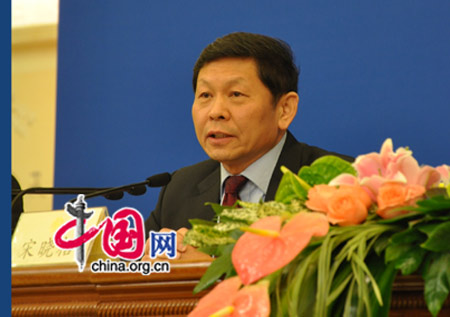Expert explains gov't public services plans
The central government will continue to invest more in basic public services, adjust the allocation structure and transform management to improve its public service system during the 12th Five-Year Plan period. The government hopes the efforts will better distribute China's economic gains to more people.
 |
|
Song Xiaowu talks at the press conference. [Photo: China.org.cn / Ren Zhongxi] |
China has invested more and more in its basic public services. A government work report delivered by Premier Wen Jiabao showed that the investment in basic public services – which the government considers as education, health care, social security, housing and culture – increased 19.9 percent in 2010 over 2009 spending.
But it still lags behind other countries when comparing the proportion of basic public services spending to GDP. "Statistics show that the share of investment in public services of GDP is 13 percent lower than countries with a GDP per capita less than US$3,000, and 26 percent less than countries with a GDP per capita between US$3,000 to US$6,000," said Song Xiaowu, vice president of the China Economic Reform Society at a press conference in Beijing on Tuesday.
The structure of public services also needs to be adjusted, Song said. Right now, the distribution of services creates income gaps. Song said the government's focus should be on poor remote areas.
Most structural problems would be solved if public services were managed differently, Song said. He said under the current system where the central government issues policies while local governments foot the bills, well-developed areas are able to offer better services than underdeveloped areas.
"I suggest the central government set a standard for basic public service and establish a unified funding system," Song said.
 0
0 






